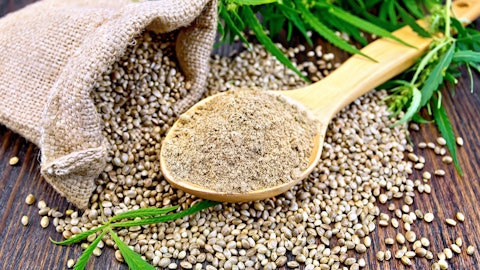The Scotts Miracle-Gro Company (NYSE:SMG) Q1 2024 Earnings Call Transcript February 7, 2024
The Scotts Miracle-Gro Company isn’t one of the 30 most popular stocks among hedge funds at the end of the third quarter (see the details here).
Operator: Good day, and thank you for standing by. Welcome to SMG’s First Quarter 2024 Earnings Presentation. I would now like to hand it over to Aimee DeLuca, Head of Investor Relations. Please proceed.
Aimee DeLuca: Good morning. I’m Aimee DeLuca, Head of Investor Relations at the Scotts Miracle-Gro Company. Welcome to our first quarter 2024 earnings presentation and business update. During our review, we will make forward-looking statements. Please be aware that our actual results could differ materially from what we share today. Please refer to our Form 10-K filed with the SEC for details of the full range of risk factors that could impact our results. We will also discuss certain non-GAAP financial measures during our remarks. These measures should not be considered a replacement for and should be read together with our results under GAAP. With me for this morning’s webcast are Chairman, President and CEO, Jim Hagedorn; and Chief Financial and Administrative Officer, Matt Garth.
Jim will provide an overall business update, followed by Matt with a brief review of our financial results through the first quarter and our outlook for the full year. Following the webcast, Chief Operating Officer, Nate Baxter; and Hawthorne Division President, Chris Hagedorn, will join Jim and Matt for an audio-only Q&A session. To listen to the Q&A, simply remain on this webcast. If you wish to ask a question, please pre-register via the audio link shared in our press release for call-in details and a unique pin. Please note that today’s session will be recorded. An archived version will be published on our website at investor.scotts.com. For further discussion after the call, you are invited to e-mail or call me directly. With that, let’s get started with Jim’s business update.
Jim Hagedorn: Welcome, everyone. Jim Hagedorn, here. I’m in my office in Marysville, Ohio. We’re opening our doors to let you see the people behind our company. We’ll also share visuals and charts to help you gain a better understanding of what we’re up to. We really love this company, and the better we communicate what we’re all about, the better you can share our view. Let me kick things off by expressing how pleased I am with the progress we’ve made and the direction we’re headed in. We’re in a different place from last year. We’re running the business the way it should be operated. And that’s a good thing. I want to give a lot of credit to the management team, which is entirely new from about a year ago. The team has created a solid plan for 2024 and is developing great strategies for 2025 and beyond.
They’re coalescing and working together well. And that’s a good thing, too. We’re all aligned to driving top line growth, tightly controlling expenses and delivering on fiscal 2024 goals that I outlined on our last call, and Matt will discuss later. Real progress is being made every day. And in fiscal 2024, here’s what we have to do: make meaningful headway on gross margin improvement; increase investments in marketing, sales, R&D and our other most competitive advantages; continue to generate strong free cash flow; allocate the bulk of this cash flow to significant reduction in our debt and leverage ratios while paying the quarterly dividend. The results of Q1 are an early indicator we’re on the right path. POS was up over 8% in dollars and units, and we picked up 300 basis points of unit market share in key categories.
The lift is due to conservative but favorable pricing actions, along with extended Fall promotions and media investment across Scotts and Tomcat. SG&A was down 11%, the result of effectively balancing cost control with investments in high-value programs and initiatives. Free cash flow, gross margin and net sales were ahead of our operating plan, setting us up well into the peak of our Q2 load-in. As for Q1 sales, I want to emphasize that last year’s sales cadence is not a predictor of how retailer load will go in this year. We’re shifting back to a more normal load. Retailers are happy about this, and so are we. Inventories are in good shape, and order flows are strong through Q2, where we need to be. There’s a lot to feel good about in our consumer business.
Everything is reaffirming our outlook for high single-digit growth. Much of this growth can be tied to a top-to-bottom relationship that we have with our retail partners. It’s no secret that retailers have been pushing for vendors to reduce prices. We agree that as commodities ease, price for consumers should come down. In fact, our fertilizer and grass seed products were getting pretty pricey last year. We didn’t see people trading down because of our pricing. They instead walked away, adopting an attitude their lawns looked good enough. Pricing does matter to consumers, and margins matter to us. We emerged from the post-COVID years with a margin decline. The best we can tell is retailers came out of this period with significantly higher margins, ours down by a similar amount.
We’re committed to significant margin recovery starting with a minimum of 250 basis points this year. This limits our ability to reduce prices. We cannot participate in a lot of cost outs until we get our margins back in the customary mid-30% range. The good news is retailers understand our need to balance price reductions with margin improvement because of our investment in brands, sales and innovation are good for lawn and garden and the category’s growth. This is the basis of the compromise we struck with them. In exchange for price reductions on select high-margin fertilizer, grass seed and soil SKUs, they’re giving us more merchandising opportunities with new listings and increased shelf space. These actions will contribute to incremental volume gains.
Some of the growth will also come from price reductions, some of which we put into place last fall and will expand in the spring. We know lower pricing did drive incremental POS last fall. I’ll shift to spring. With durable sales and foot traffic being challenged at retailers, lawn and garden is critically important to their growth. And this is a space that we own. We’ll invest heavily in our brands and sales support to drive engagement and takeaway. These include high-impact programming and creative, highly focused engagement with our core consumers, messaging delivered by influential celebrities with consumer credibility, and lots of repetition starting in March on mass media, television, streaming platforms, cable, entertainment and radio around major sporting and news events.
The impact of our spending and approach is substantial. Each brand will reach its target core consumer audience at least 17 times. We’ve increased working media significantly over last year. Miracle-Gro will get 80% more marketing support. And through collaboration with Bayer, Roundup will spend 20% more. With Scotts, we’ll adjust the timing of our advertising and promotions for better lift. We’ll allocate 33% more of our spend to peak weeks for Scotts. We are supporting the advertising blitz with powerful creative and celebrities. Miracle-Gro has an exciting new partnership with home and garden icon, Martha Stewart. She is a multi-generational talent who epitomizes gardening and is the most authentic and influential personality in the space.
Martha is an enthusiastic user for our products, and is a true believer in Scotts Miracle-Gro. In lawns, we’ll build upon the success of our Scott for Scotts campaign starring Kristofer Hivju from Game of Thrones. Our data shows the creative approach drove strong levels of awareness and breakthrough that are keys for our seasonal business. The significant build to this year’s campaign, includes the launch of Scotts Healthy Plus Lawn Food. It promotes overall lawn health through year-round preventive and curative disease control with fertilizer for deep greening. This product will replace SummerGuard, creating a wider application window and incremental POS opportunities. On the sales front, there’s no one better than us, period. To this end, we’ll continue to invest in our field sales team and have 10% more merchandisers than last year.
We’ve taken the power of our sales force and hooked it up with Bonnie’s team to increase attachment. Innovation gives us an opportunity for other incremental gains. Miracle-Gro this year is launching an important new organics line. And later in the season, we’ll heavily promote the new healthy fertilizer. Hawthorne was cash flow positive in fiscal 2023 and will be again in 2024. Over this two-year period, it’s on pace to be cash flow positive by more than $120 million. Hawthorne is a major contributor to our debt pay down. We have a two-pronged strategy with this business. First is short-term profit improvement and cash flow generation. Hawthorne has the best collection of brands in the industry. And we continue to restructure its product line to focus on the higher margin and more profitable Hawthorne-owned Signature portfolio.
Second is the long-term solution to recapture as much of our investment in Hawthorne as possible and unlock its future value as the market matures. We’re exploring value-creating options and potential partnerships that we expect will happen in phases, especially as progress is made on the regulatory front. The federal government is moving closer to rescheduling cannabis as a Schedule III drug to make justice system more fair and reduce taxes on plant-touching business by over 50%. This can be a major catalyst to cultivators reinvesting in their operations. Adoption of the Safer Banking Act is on the table as well, which would give the industry access to normal bank capital. These are potentially significant tailwinds for Hawthorne. In the run-up to our Annual Shareholder Meeting last month, we reached out to shareholders on proxy issues and for general feedback.
They indicated they are pleased with our progress. They want to know, if we could accelerate our recovery by about 12 months. Matt and I continue to evolve our multiyear financial strategy. There is agreement at corporate and among the operating teams as to what the financials should look like. Here’s what to expect, 3% annual top line growth, gross margin in the mid-30% range and free cash flow directed to debt pay down that drives financial flexibility and shareholder-friendly actions. We’ll share more about our long-term financial plans later this year. Just as promising as the fact that consumers are engaged, based on recent surveys, they intend to participate at consistently high levels. I’ll remind everyone that, we outperformed the category in fiscal 2023 and this last quarter.

All the work, we’re doing now is the building block of the future. And it’s the basis for our optimism. In closing, I want to thank everyone for their support, commitment and hard work. Most importantly, I’m grateful for the collective belief in Scotts Miracle-Gro and our vision to help people of all ages express themselves on their own piece of the earth. It’s a reminder that what we do matters to people, the environment and communities. Thank you, and I’ll turn it over to Matt.
Matt Garth: Thank you, Jim, and hello, everyone. I’d like to start by sharing some perspective on how the first quarter fits into our full year. Q1 typically represents less than 15% of our annual POS and sales. However, it is an early indicator of how well we’re tracking our plan. It’s the quarter that lays the foundation for the start of our season and provides important insight into how well our stores sets, load in and advertising are coming together. Season readiness is our focus right now. And I can say that based on the execution of our marketing, sales and supply chain teams, we’re in a good place. Overall, first quarter 2024 exceeded our expectations, mostly due to the strength of the U.S. Consumer business, which more than offset a slower pace of Hawthorne sales.
U.S. Consumer POS was 8% above last year in both dollars and units. This is a reflection of a strong fall, along with the conservative but favorable price elasticity on key items, such as fertilizers and soils. The takeaway is consumer engagement is pacing well. As for invoice sales, we were below Q1 of 2023, but this was expected and in line with projections that this first quarter would have shipment levels similar to pre-COVID historic patterns. Again, the aberration in shipments was last year, when we had a heavy early season load-in in cooperation with retailers. Bottom line, we are aggressively managing what is in our control, helping us to return to a more normal state of operating. Now let’s dive into the quarter. Net sales on a company-wide basis were down 22% versus Q1 last year, with a decline of 39% at Hawthorne and U.S. Consumer sales down 17%.
Again, the reduction in U.S. Consumer sales is due to the change in shipping cadence. Retail inventories are well positioned for the second quarter load-in following the strong first quarter POS. Retailer inventory units ended down low double-digit percentage in Q1 versus the prior year, which is consistent with our plan. Hawthorne sales pace has performed similarly to what we saw at the end of last year. While there is no uptick in underlying market conditions to point to, the team is executing on its strategy to narrow the product portfolio to fewer, but more profitable brands. This lowers the top line, but improves overall margins. So far, this initiative has improved Hawthorne’s portfolio mix to 77% signature versus distributed brands from 65% a year ago.
Turning to the full year outlook. We are reaffirming our guidance of high single-digit growth in the core U.S. Consumer business. Our original guidance estimated Hawthorne net sales would be down low single-digit percentages for the full year. That outlook is under review. To be clear, we will continue to make adjustments to target breakeven or better adjusted EBITDA for the segment. The adjustments are already having an impact. Jim talked about how the segment is cash flow positive. Additionally, the sales run rate for signature brands is outpacing distributed brands by two times. Here are a few other points from the first quarter. Gross margin improved 400 basis points year-over-year. Consumables mix increased 400 basis points versus durables mix and stands at 54%.
Given the rapid pace of change in the business and our ongoing actions, we are working on a guidance update to share with you. This includes an update on discussions with potential partners as part of our effort to redesign the business and create maximum shareholder value. Now let’s take a look at gross margins. The year-to-date adjusted gross margin rate for the total company ended the quarter at 13.7% of sales versus 20.1% last year. The reduction was driven by lower volumes and absorption in both operating segments, along with sales of higher cost inventory. We continue to expect the full year adjusted gross margin rate will improve by at least 250 basis points as we realize significant Project Springboard savings, lower our distribution costs and drive a favorable segment and product mix.
Material costs and fixed cost leverage are also expected to improve slightly towards the back half of the year after we work through approximately $275 million of higher cost inventories that are mainly in the US Consumer business. We will have further runway in fiscal 2025 to improve the total company gross margin rate when we are back to full production, driving fixed cost leverage and benefiting from lower-cost inventories. At this point, commodity-sensitive materials are about 65% locked for the year, and total cost of goods sold are about 70% locked, giving us fairly good visibility for the remainder of the year. Turning to SG&A. The first quarter was down 11% versus Q1 last year and down 26% on a two-year basis. This reflects Project Springboard progress and significant headcount and project spend reductions.
We still expect company SG&A expenses between 15% and 16% of net sales for the current and future years. As Jim said, we are redirecting some savings into activities that drive value. This includes US Consumer investments directly focused on brand marketing, which will increase $10 million or 12% year-over-year in support of the media strategy. Interest expense was flat to last year, and we continue to expect it to remain flat for the full year as the benefit of lower net debt is offset by higher interest rates. Interest rates are 72% fixed as of the end of the first quarter under a combination of long-term fixed rate notes and interest rate swap agreements. Note that $2.2 million in other income and expense is associated with the new accounts receivable sale facility.
The adjusted effective tax rate in the quarter was 29.5%, and we anticipate full year ETR to be between 29% and 30%. Finishing up the P&L. Our net loss for the quarter was $81 million or $1.42 per share on a GAAP basis compared to a loss of $65 million or $1.17 per share last year. On an adjusted basis, which excludes impairment, restructuring and other non-recurring items, we reported a loss of $82 million or $1.45 per share compared with a loss of $56 million or $1.02 per share a year ago. Non-GAAP adjusted EBITDA for the quarter was a loss of $26 million versus income of $21 million last year, primarily driven by lower volume and gross margin rates across both operating segments. The decline is primarily related to the phasing we have discussed.
We are reaffirming our total company EBITDA target of $575 million for the full year. Now continuing with the balance sheet. We ended the quarter with net leverage at 7.2 times adjusted EBITDA, comfortably below the covenant maximum of 8.25 times. As is typical with our seasonality, we expect working capital needs and associated leverage to peak at the end of the second quarter, when our covenant maximum will be 7.75 times, followed by 6.5 times for Q3, and 6 times for Q4. Note that we expect to end the year comfortably below the maximum covenant and into the 4s. Liquidity is strong with over $1 billion of available capacity under our revolving credit and AR sales facilities. As we head into Q2, outstanding debt of $3 billion as of quarter end represents a $384 million reduction year-over-year from reduced working capital needs and reduction of previously purchased inventories.
Planned CapEx for fiscal 2024 was $70 million, a decrease of more than $20 million versus fiscal 2023, with the majority of projects expected to generate favorable ROIC. We are directing free cash flow to debt paydown and maintenance of our quarterly dividend. As mentioned, free cash flow is expected to meet or exceed $560 million, the balance of $1 billion over two years, driven by sustainable annual free cash flow of more than $300 million plus one-time improvements in net working capital balances. I remind you that everything we’re doing across Scotts Miracle-Gro is centered on driving value. This is grounded in our three 2024 objectives; generate $575 million in adjusted EBITDA through top line growth; 250 basis points of gross margin rate improvement, and a continued tight rein on SG&A; deliver $560 million of free cash flow, the balance of our goal of $1 billion over two years.
This includes managing total company inventory to fiscal 2019 levels of around $600 million. This cash will allow us to deleverage by $350 million or more, along with retaining our quarterly dividend. And determining a solution for Hawthorne that will capitalize on the future potential of the industry and create maximum value for shareholders. We are making meaningful progress on each of these objectives. And in doing so, laying the groundwork for sustainable shareholder value creation. Two notes to finish up on. First, you will find a summary of our annual guidance in the appendix of today’s presentation. And second, I look forward to providing you an update on our second quarter at the Raymond James 45th Annual Institutional Investors Conference, March 4th in Orlando, Florida.
And with that, we can move to questions. Thank you.
Operator: [Operator Instructions] Our first question comes from Joe Altobello with Raymond James. Your line is open.
See also 15 Highest Quality Bath Towels of 2024 and 20 Dating Sites with the Most Users in 2024.
Q&A Session
Follow Scotts Miracle-Gro Co (NYSE:SMG)
Follow Scotts Miracle-Gro Co (NYSE:SMG)
Receive real-time insider trading and news alerts
Joe Altobello: Thanks. Hey guys, good morning. First question, I know it’s a small quarter, but maybe talk about some of the drivers of that 8% POS growth. And I guess a follow-up on that, is the full year outlook still flattish? Or is that improving as well?
Jim Hagedorn: Is the full year outlook for POS?
Joe Altobello: POS, yes.
Jim Hagedorn: Look, here’s the thing. I think I’ve been outspoken that I was really unhappy with our deployment of those marketing support dollars in the fourth quarter. There is a view coming out of the Fall that it worked, I don’t buy that. I think, Joe, what happened is, we had started making deals with retailers and to get some cost out of particularly lawn products, seed products and, I guess, some dirt products. Those prices went into effect in the fall. The promotion for the fall, I think, was extended in a good way, I think, mostly the retailers. But the price adjustments really worked. And so if somebody was to say what was driving that, I would say sort of good promotions at the retail level, our people doing their jobs to make sure the products in and ready to go.
But the price reductions were pretty immediate. And so I think when you listen to Matt words and my words, you heard this price elasticity, price adjustments. Those were negative price adjustments that were part of merchandising plans we were putting together for 2024. Those prices went into effect at retail, and I think they worked really well. So that’s what happened.
Matt Garth: And then when you take a look, Joe, so specific movements year-over-year in the fourth quarter, that 8% lift on POS, as Jim said, driven by yes, some elasticity that helped us. That was good. And then also the extended positions we had with our retail partners that began in the fourth quarter. You’ll see that really pick up as we move into the second quarter. For the full year, remember, what we said is high single-digit growth on the top line for the company, which is comprised of POS at the core consumer level staying relatively flat year-over-year. The main drivers are those extended positions that we’re getting of new listings and new promotions. Price will be down. That continues, and we’ve seen that here in the first quarter. You saw that. But that’s being offset by that elasticity. So that still leaves us in the high single digits range.
Jim Hagedorn: And still accreting our gross margins by at least 250 basis points. So we actually feel pretty good about it. And I think if you look at the share in Q1, I think that’s also a reflection of different merchandising programs at the retail level.
Joe Altobello: Got it. Very helpful. And maybe just to shift over to Hawthorne. Obviously, the revenue guidance is under review. But has your outlook on that segment’s profitability changed since you left your EBITDA guide unchanged at $575 million?
Jim Hagedorn: Here’s what I would say. I think, I saw your note this morning, and like we withdrew guidance. And I’m sort of sorry about that, because profitability will be higher, okay? Margins will be better. And nobody has changed the cash flow targets. That’s something we’ve been — and that’s what I focused on in my talk. So I’m not sure, if you said profits are the same or higher. Cash flow is good and important for the business, and they’re in the middle of sort of trying to figure out our go-to-market strategy. And if you look at what’s happening with, I think, what they call our signature brands, which are our brands, the business is pretty good. So I think it’s the distributed brands that we’re kind of moving from.
And I think what you’re seeing in those numbers is part just non-recovery. And so I think we can’t sort of hide that is that the — I don’t know, did I use those words? It was in my script there, that the market recovery is elusive or something. What may have been in the annual meeting script is that the recovery in hydroponics remains elusive. But it’s being accentuated by the fact that we’re making choices in what we push and sell. Anything you want to add, Chris?
Chris Hagedorn: Yes, sure. Look, Jim already said it. But it really — the revenue call down, I think is — or just results are really, as Jim mentioned, a result of us taking a hard look at the portfolio and making decisions, I think, that are important for our business to focus on brands that are — and products that are just higher profit for us. And those are, in many or most cases, our signature products. So it’s about really leaning out the offering, making sure that we’re selling brands that we can make good money on and we can support properly and looking at the health of the business through that lens.
Jim Hagedorn: Joe, I think that from my point of view, without a doubt, the operating team, Chris and Tom and the group of men and women who operate with them, they are enhancing the profitability of the business. And part of that is they’re making choices then on being the best Hawthorne they can be based on where the business is at right now. I continue to be optimistic about the business, and I think I talked about that, which is that there is — a lot of our business or the biggest part of our business is lighting. So when we talk about a move toward consumables, away from durables, that just means that there is just a drought of capital to improve these growth facilities. And rescheduling to three, let’s just assume that happens.
I think it’s gone from HHS to DEA, the President supports it. I think that what you read, and I think the politics of it is it seems to us it’s likely to happen. And it’s not that it’s perfect, the Schedule III is a perfect place. But what it does do is it solves the issue of 280e. And instead of having 80-plus percent tax rates, you go back down into sort of, I don’t know, 20, call it, at the federal level. That will free — that will significantly increase the profitability of legal growers. This — and that’s a lot of money. And if Safe Banking, which I think the Senate side is good, the House is a little hard to predict now. But I think that it has passed the House numerous times. Safe Banking, where there’s access to capital to like real bank capital at proper prices, which is probably half of what today people in the alternative credit market are sort of — that will be — both of those things will be really positive.
And we believe that there’s years of capital investment in these growth facilities that’s overdue. And I think this will be really good for the business. So what my concern — and this is that Chris and Tom and the teams down there, they want to be good citizens here. And they’re not messing around when it comes to doing the things they think needs to be done to enhance the profitability of the business. And you might listen to that and say, well, of course, that’s such a good thing. My concern is that we not let waste the things that are really important on the innovation side. And a lot of that is in lighting and nutrients, how to use these products, all the supplies that go into it, genetics, that these are really important parts of the future.
And this business is in a very weird artificial sort of politically driven place where no one who’s legal can make money. And so I think the future is very important to it. And so I don’t — this is the tension that exists between me and the operating team. I’m not sure — I think Matt is somewhere in the middle.
Matt Garth: I have to tell you, actually, the way that you just went through that and the conversations we’ve been having internally, I think it’s fair to share with everyone. We put out a long-term model for what Scotts Miracle-Gro is, right? 3% top line growth, we can get into that. Margins back into the 30s, we really didn’t talk about Hawthorne. It’s because there’s so much future potential that exists. And by and large, it’s kind of being ignored today. And ignored in our equity, ignored in others’ equities. And it’s a construct of a very difficult environment to make money in. And like we said, the ability to apply capital in that marketplace is very difficult right now. So opportunity abounds as you move forward, but it is hard to put into place right now what’s right. But what we do know, whether it’s the Scotts model or the Hawthorne model, investing in the future, the things that we know, innovation, marketing, our sales force, those pay off.
Jim Hagedorn: And Joe, sorry for the long answer, but this is one that we have been talking about a lot. We had a Board meeting last week. We’re sort of believers in the future. And what — Chris and Tom are operating in today’s world, which is a little more short-term. And that’s not meaning that that’s where they want to be. But I think they have to operate in our family, here in our community, and they want to add to it. Now the part of the script where we talked about cash flow, which is over two years, more than $120 million of free cash flow coming out of Hawthorne, that is a major contributor depth. They aren’t complete referbates. And this business is going to get better. And we have a lot of — I guess, we’d call it deal making, but we have a lot of stuff that we can’t really talk about right now, but you’re going to start to see.
I just don’t want the business to become kind of what I keep telling them is a circus curiosity, where we allow ourselves to become small enough that were kind of irrelevant and the things that are going to drive value in the future, we let escape. One, I mean have this conversation in an earnings call, but here we are. So, non-total reprobate speaking. Look, to be clear, the choices that Tom and the team and I are making to be good corporate citizens and to return a sort of requisite level of profitability into the enterprise. I think we’ve done it with a really high awareness of the things that have made Hawthorne, unique and special and the most — I think the most successful business in the hydroponics space to this point. And we have no interest in losing those things.
And I would say they’re — look it’s innovation, it’s the investment we put in our brands and our sales force. It’s the work that we’ve done in collaboration with Scotts on the government relations side to try to affect some of the change that Jim is talking about with rescheduling. So we’re very sensitive to maintaining those aspects of the business that we do believe are unique and continue and have to be for Hawthorne to remain the business that it was, and I think still is, despite the results. So we’re trying to make some very conscious and intentional choices. But look, there is that tension and balance between healthy, between, again, just a baseline level of short-term profitability without sacrificing the future potential of the business.
And that is really going to be achieved, as Jim mentioned, through partnerships that we can’t quite talk about yet, but we think have a huge amount of potential to help us get through this period while again, not becoming reprobates.




